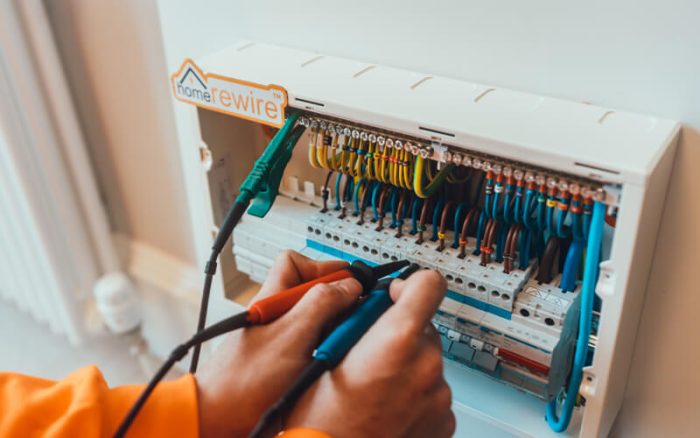
Electrical wiring is something that most of us take for granted, and don’t really think about until disaster strikes.
Spotting the signs of degradation over time, however, can help you to prevent major problems from occurring and tackle smaller issues such as reduced efficiency before they escalate.
If you have begun to spot signs that your home’s electrical system isn’t quite working as well as it once did, it is time to consider a rewire.
This may sound inconvenient and expensive, but the fact is that it has a huge number of benefits, both financial, and in terms of safety.
A rewire will significantly reduce the risk of electrical fires from starting or electrocution incidents occurring, increase the value of your home, and save you money on electric bills by increasing efficiency.
At Central FS, our team of expert electricians provides a range of rewiring scotland services from home upgrades featuring the latest audio-visual equipment installation, to simply making a property habitable and dealing with emergency situations.
We have put together a list of the most common signs to look out for that could suggest that your home could do with a rewire:
1. Old Age
If your home is old, around 50 years or over, and there is no evidence that a rewire has ever been conducted, it is time for an upgrade.
Older wiring simply wasn’t designed with the technological needs of a modern home in mind and is, therefore, much more likely to be overwhelmed.
Electrical problems are responsible for as much as 10% of all residential fires, and old wiring especially is responsible for a significant percentage of these.
Even if the wiring installed in your home can cope with the requirements of your home, over time there is a good chance that the protective casing around the wires has begun to fray or wear away, creating a major fire risk.
2. Flickering lightbulbs
A flickering light in a single room in your home is likely to indicate that the bulb is beginning to reach the end of its life and needs to be replaced.
If you have replaced the bulb and it is still flickering, or multiple bulbs within the home are flickering on a regular basis, you need to schedule an electrical inspection as this is a sign of an underlying issue.
Multiple flickering lights within the home are a strong indication that you may have loose wiring connections and remediation, or replacement is required.
The only way to know for sure what the problem is with your lights is to have them inspected by a qualified electrician so get in touch the moment you have any concerns.
3. Discolouration
Discolouration such as black or dark brown marks on or around the plug sockets or light switches in your home is a very serious sign that wiring may be faulty and a professional needs to take a look.
Visible signs of burning, such as these, are possibly the biggest indicator that your wiring is significantly compromised and is probably shorting and creating sparks on a regular basis.
This is a major disaster just waiting to happen so if you have seen burn marks anywhere near the electrical sockets in your home, call your local electrician immediately.
4. Burning smell
Similar to visible burn marks, a persistent smell of burning within the home, with no obvious alternative cause, may indicate that your wiring is shorting and creating sparks that are singing the interior of your walls.
This means that you have already been lucky to have avoided a fire breaking out and should be considered an emergency situation.
Any signs of burning within your home should immediately addressed by a qualified electrician, or the fire service if the situation is dire.
5. Lack of Outlets
If you are finding yourself using multiple extension leads to meet the power needs of your home you should consider a rewire to install more outlets.
Older properties, which were built when the average home had far fewer appliances requiring power than is the case in the modern day, often don’t have enough wall sockets
Overusing extension leads can increase the risk of electrical fires and other safety problems so have the issue resolved before it becomes a complete nightmare.
6. Electricity cutting out
The circuit breaker in your home is designed to cut off the electricity supply if too much power is judged to be going through your wiring.
This is a safety feature to protect your home from power surges and if you are experiencing frequent power outages there is likely to be a problem either with your wiring or with the circuit breaker itself, and an electrical inspection is required.